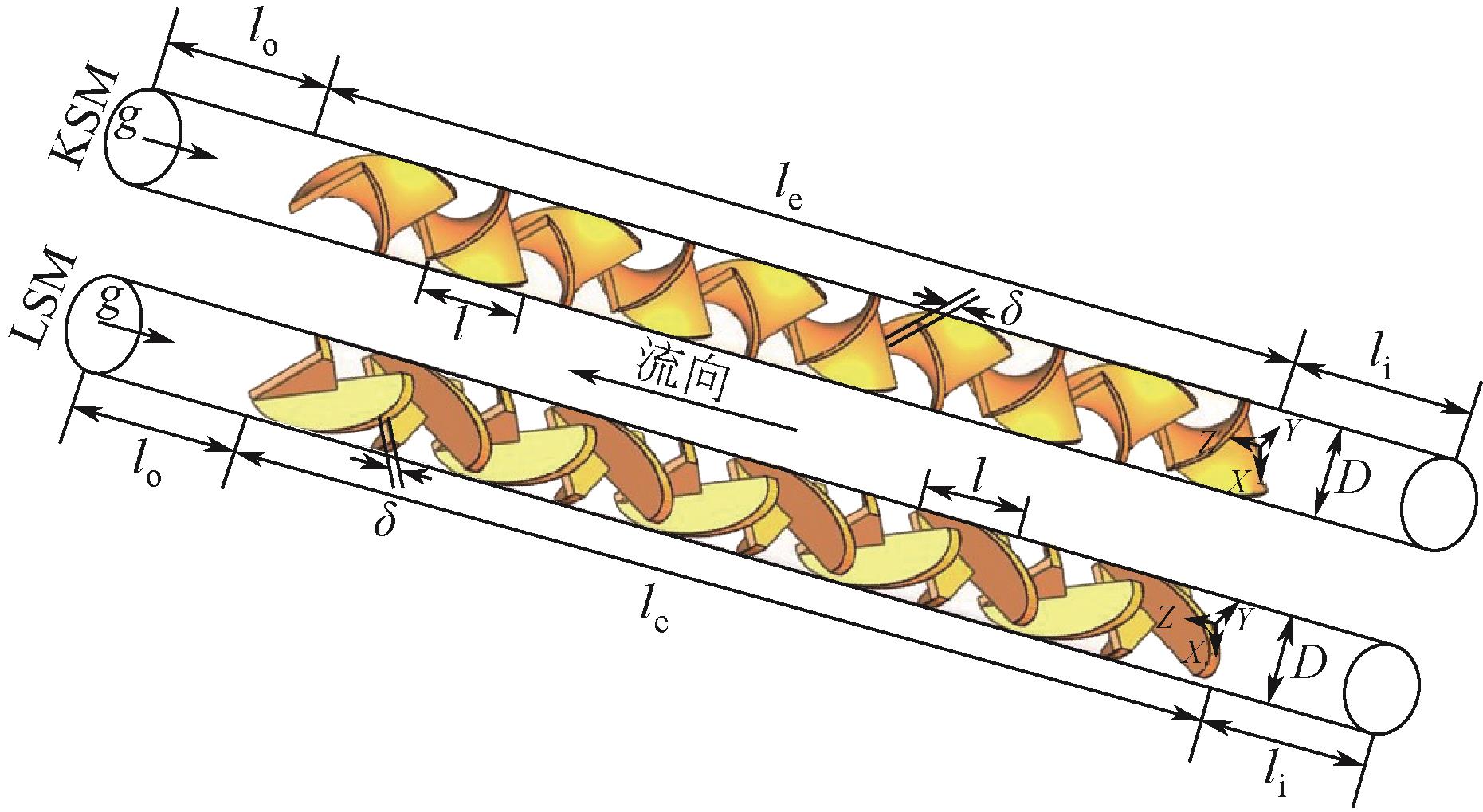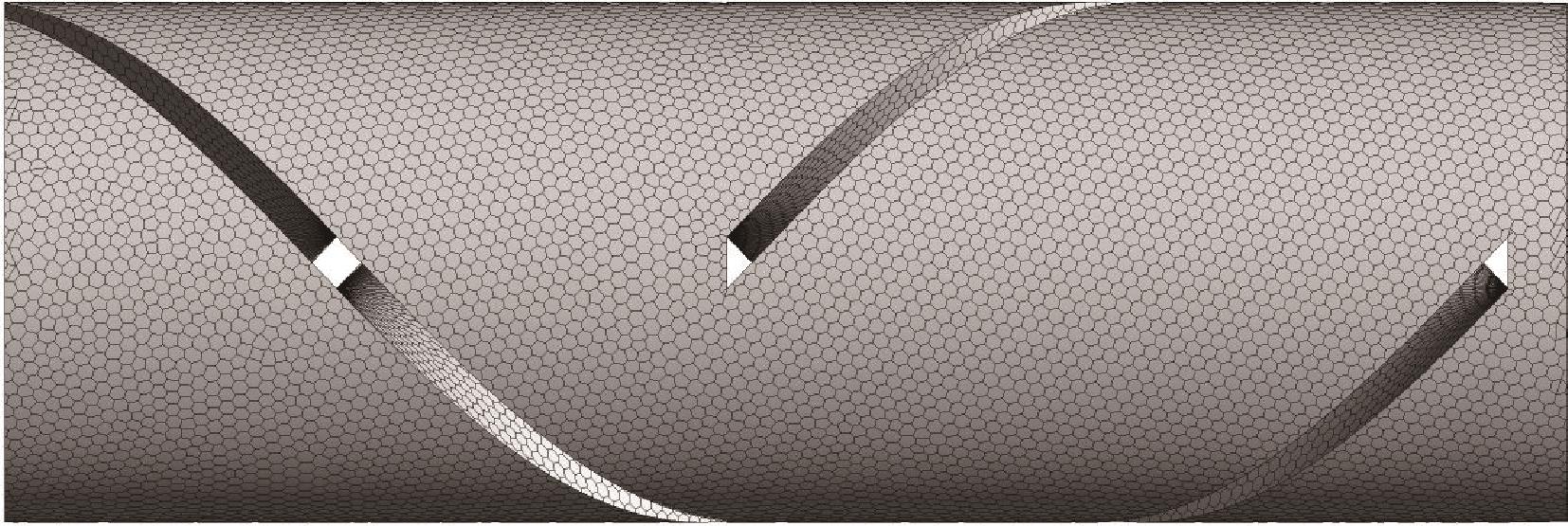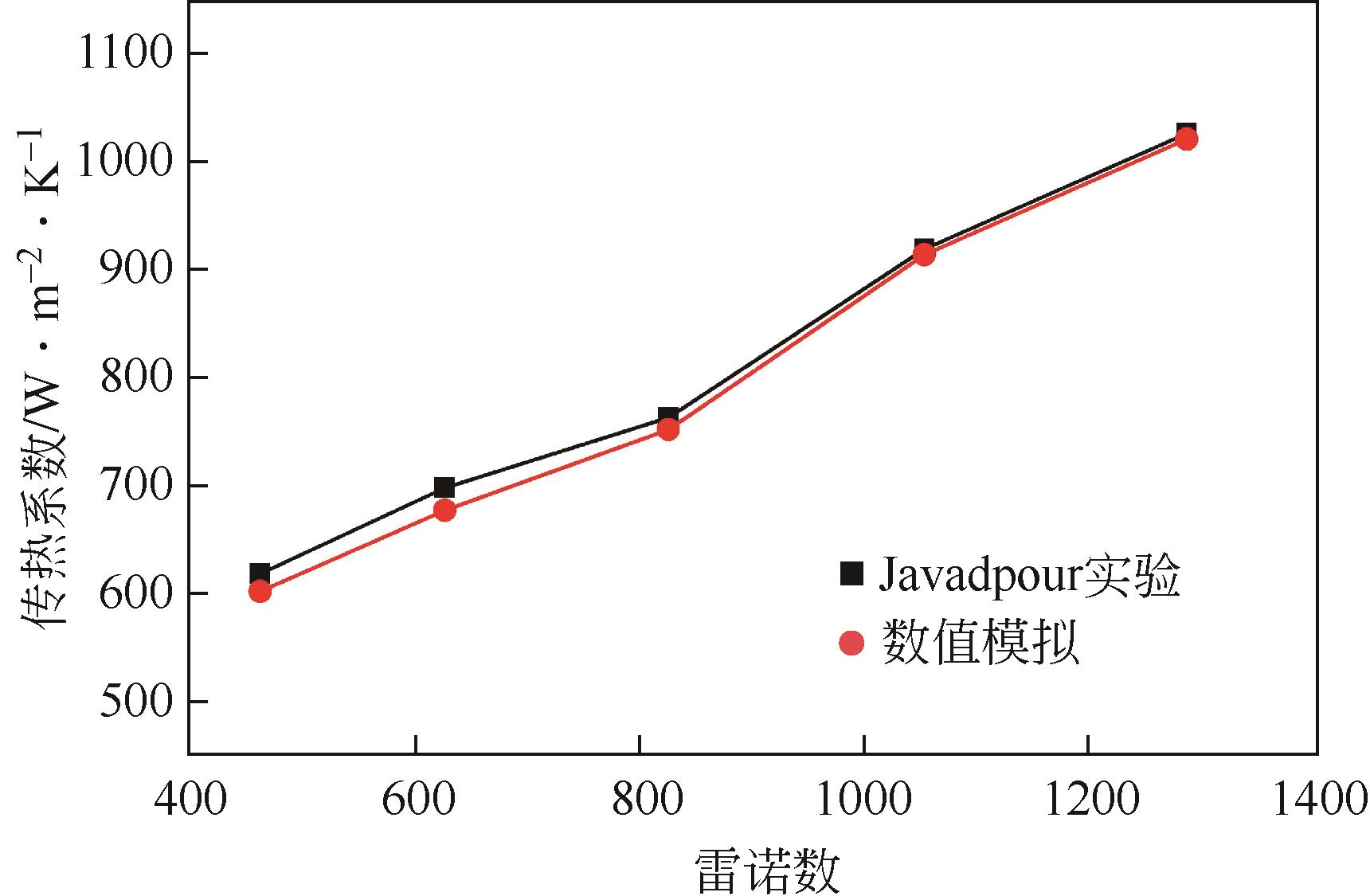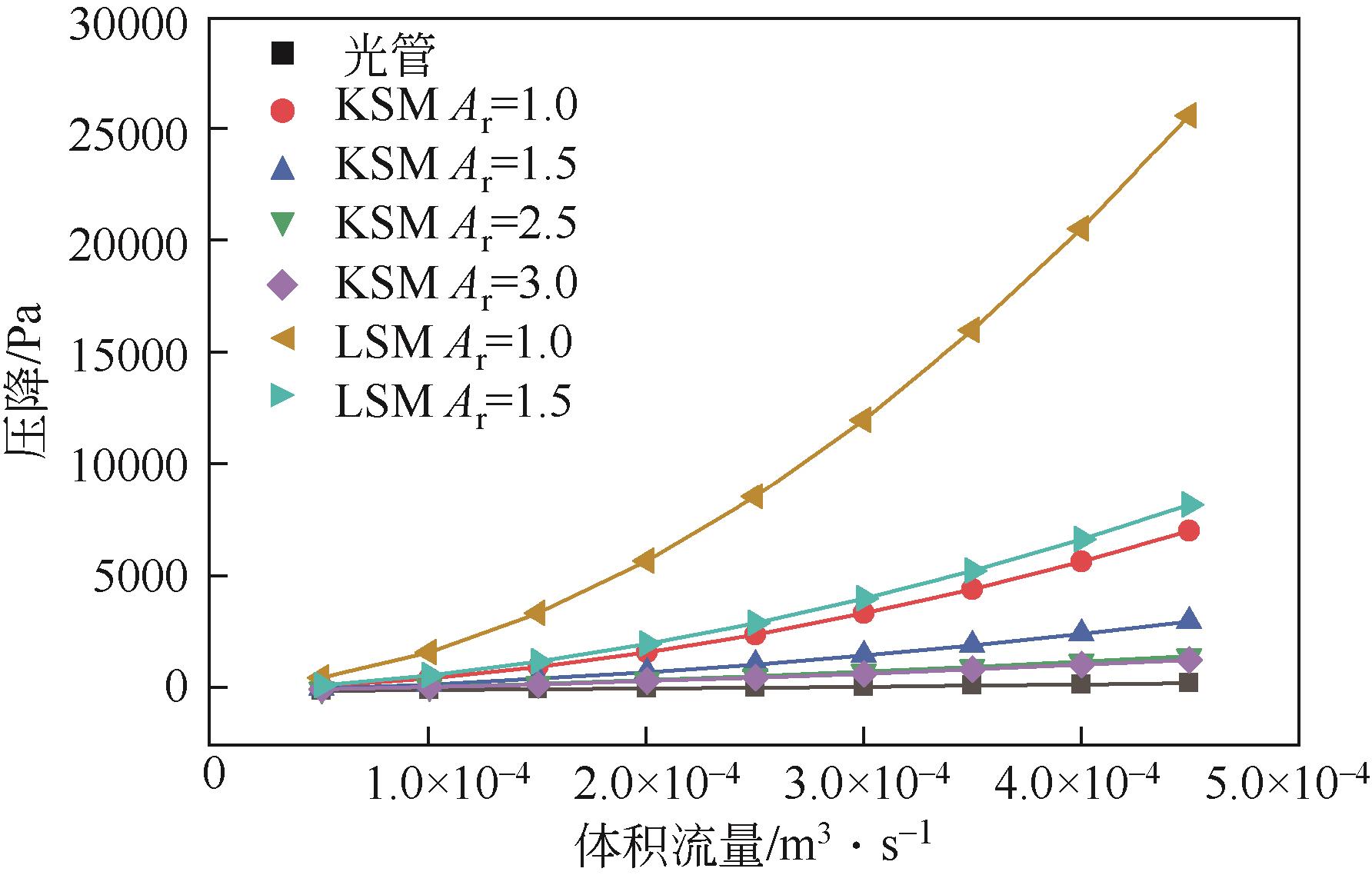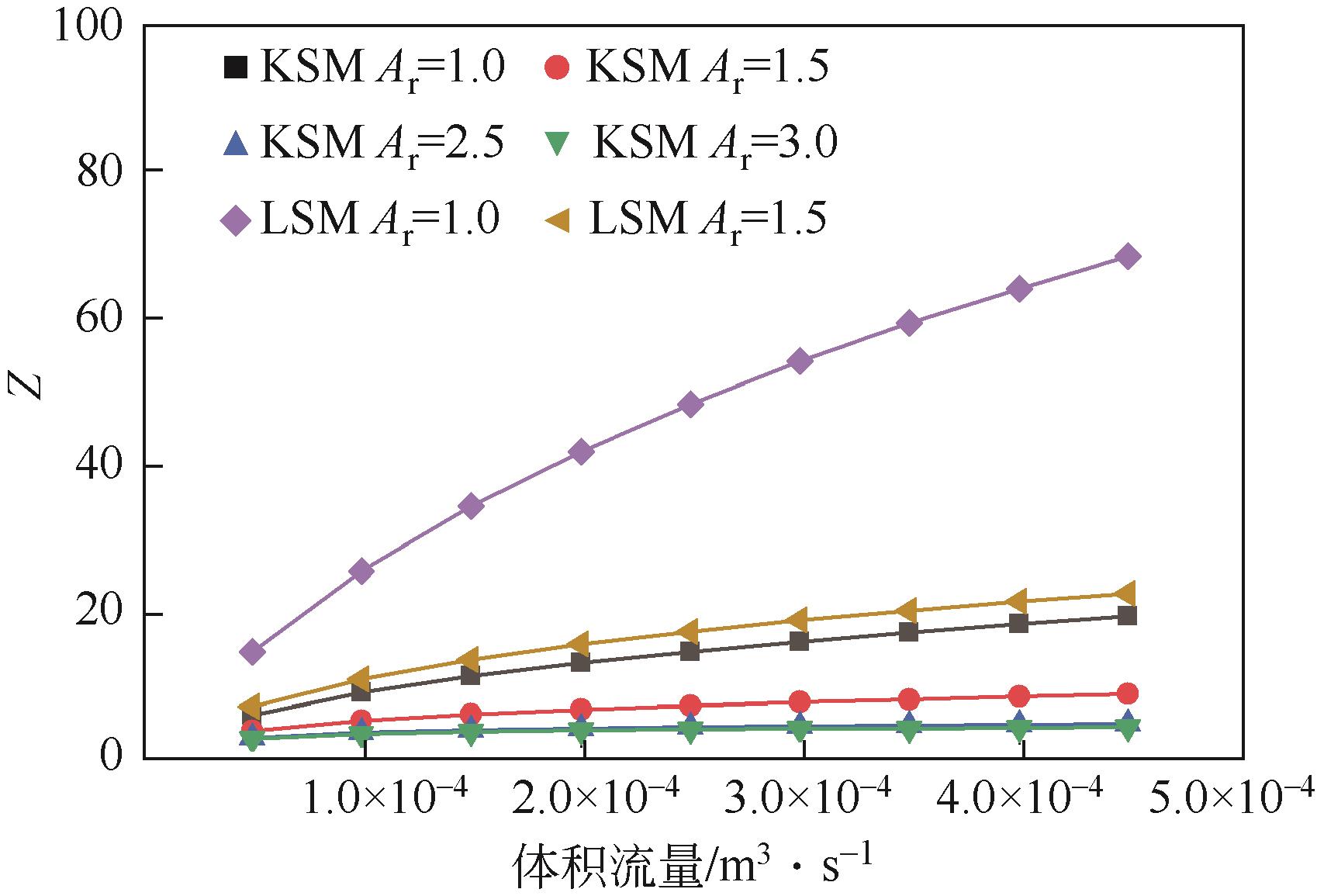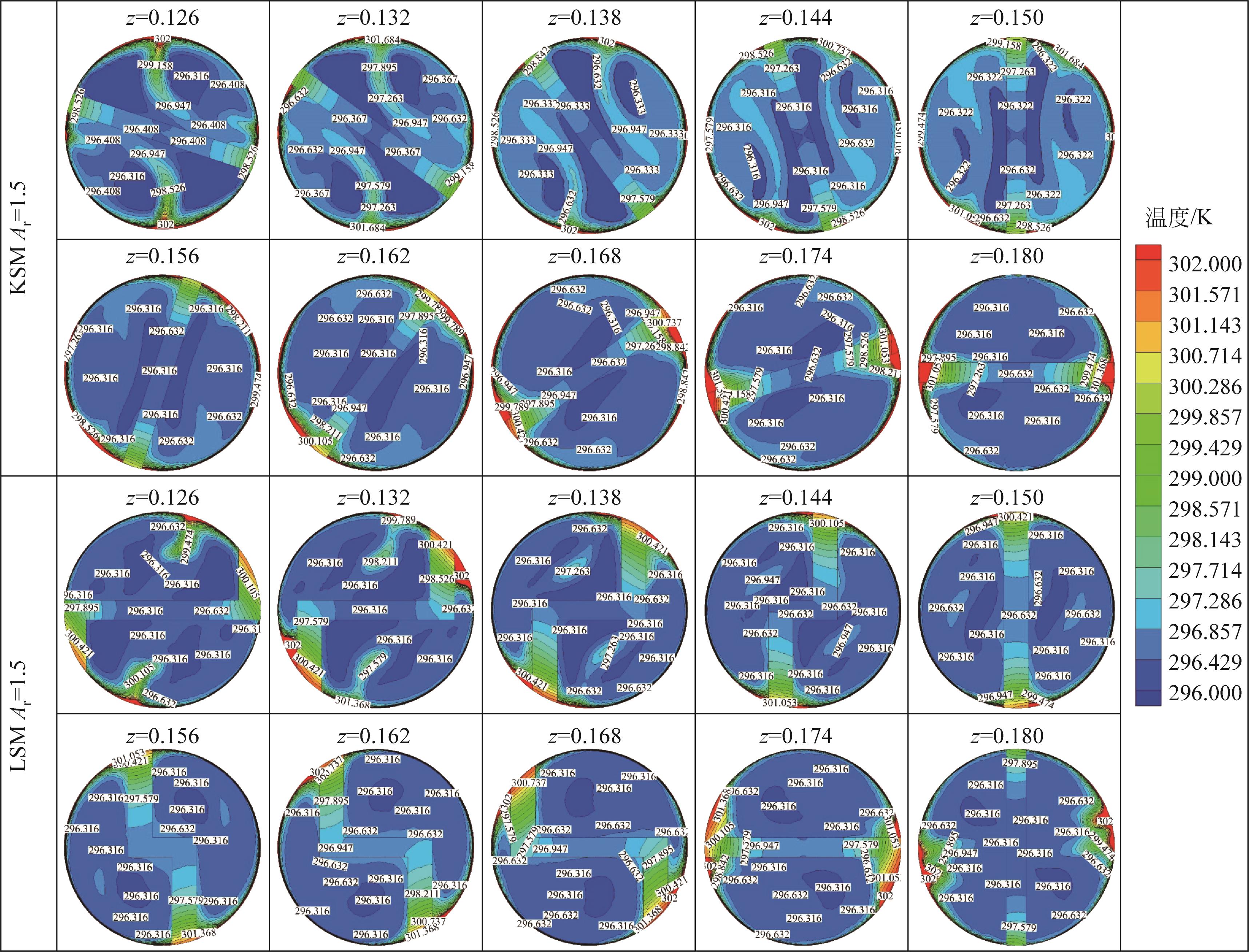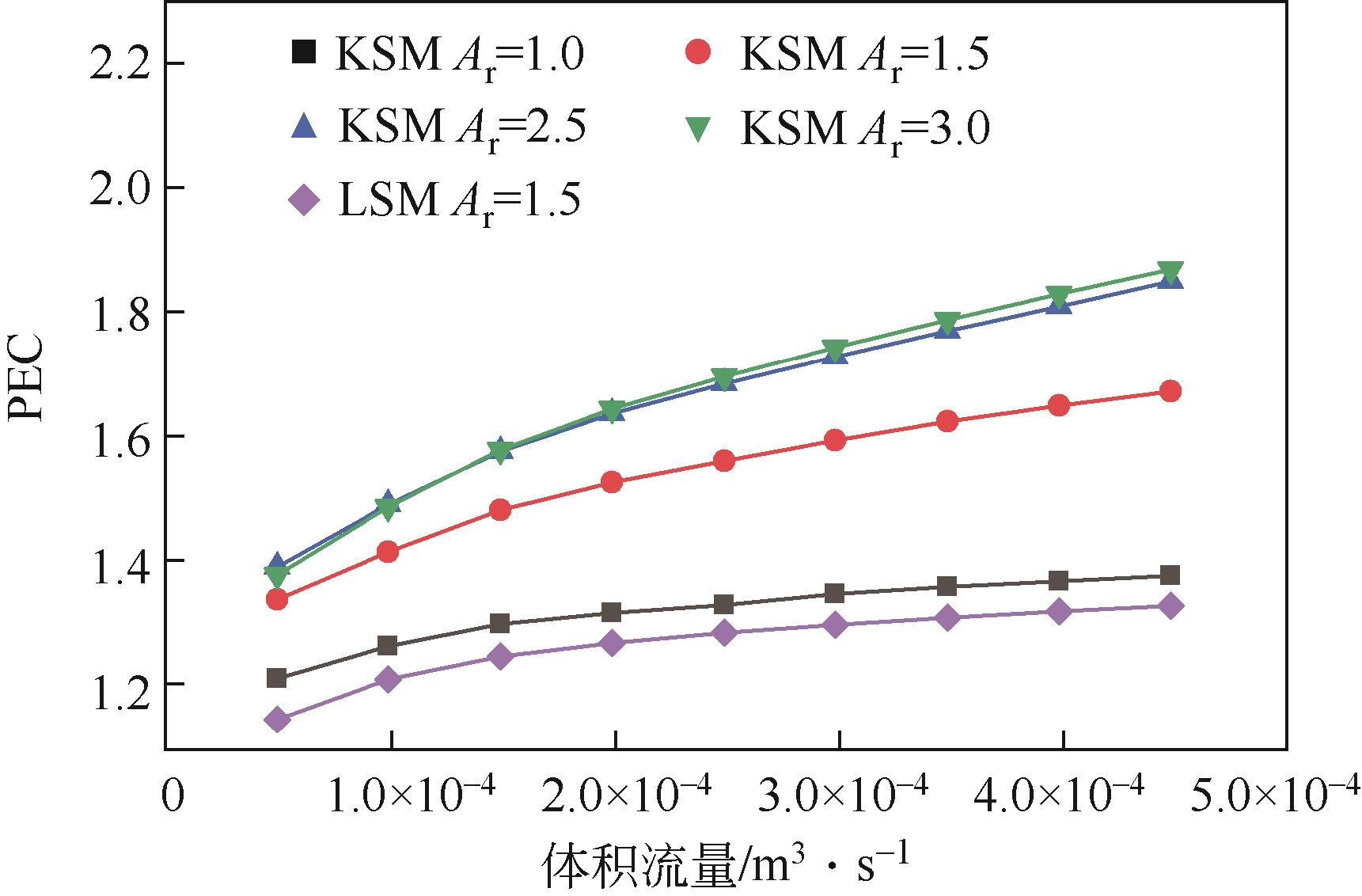化工进展 ›› 2024, Vol. 43 ›› Issue (3): 1145-1156.DOI: 10.16085/j.issn.1000-6613.2023-0375
• 化工过程与装备 • 上一篇
非牛顿流体在叶片式静态混合器中的传热强化特性
禹言芳1( ), 丁鹏程1, 孟辉波2(
), 丁鹏程1, 孟辉波2( ), 石博文1, 姚云娟1
), 石博文1, 姚云娟1
- 1.沈阳化工大学机械与动力工程学院,辽宁 沈阳 110142
2.中国石油大学(华东)新能源学院,山东 青岛 266580
-
收稿日期:2023-03-13修回日期:2023-04-24出版日期:2024-03-10发布日期:2024-04-11 -
通讯作者:孟辉波 -
作者简介:禹言芳(1979—),女,博士,副教授,研究方向为化工过程强化。E-mail:taroyy@163.com。 -
基金资助:辽宁特聘教授计划(辽教函[2018]35号);国家自然科学基金(21476142);辽宁省教育厅重点项目(LJKZ0429);辽宁省自然科学基金(2022-MS-290);青岛市自然科学基金(23-2-1-236-zyyd-jch);中国石油大学(华东)引进人才科研基金(R20220113)
Heat transfer enhancement of non-Newtonian fluid in the blade-type static mixer
YU Yanfang1( ), DING Pengcheng1, MENG Huibo2(
), DING Pengcheng1, MENG Huibo2( ), SHI Bowen1, YAO Yunjuan1
), SHI Bowen1, YAO Yunjuan1
- 1.School of Mechanical and Power Engineering, Shenyang University of Chemical Technology, Shenyang 110142, Liaoning, China
2.College of New Energy, China University of Petroleum (East China), Qingdao 266580, Shandong, China
-
Received:2023-03-13Revised:2023-04-24Online:2024-03-10Published:2024-04-11 -
Contact:MENG Huibo
摘要:
非牛顿流体在化学、食品和材料等领域具有关键作用,但高表观黏度使其通常具有低传热特性。叶片式静态混合器作为一种高效的传热强化设备,在化工过程强化中具有鲜明的技术特色。本文针对非牛顿流体在Kenics静态混合器(KSM)和Lightnin静态混合器(LSM)内的流动和传热特性进行了比较研究。重点分析了体积流量、元件长径比及流体浓度等参数对羧甲基纤维素(CMC)幂律流体的流动及传热影响。结果表明,在相同工况下,随着CMC溶液的体积流量增大,管道内的换热系数和压降均增大。静态混合元件的插入使得换热系数和压降显著提高且Lightnin元件产生的影响更明显。元件长径比和CMC溶液浓度影响流体在管道内的流动和换热。随着长径比的减小,传热性能得到提高,但其增大的阻力系数影响占据主导地位,综合换热性能系数(PEC)降低。溶液浓度的增大使得管道换热能力逐步削弱,并对管道内压降的提升有显著影响,综合换热性能降低。总结得出,在体积流量为4.5×10-4m3/s,质量分数为0.374%、长径比为3.0时,KSM的PEC最大为2.114。
中图分类号:
引用本文
禹言芳, 丁鹏程, 孟辉波, 石博文, 姚云娟. 非牛顿流体在叶片式静态混合器中的传热强化特性[J]. 化工进展, 2024, 43(3): 1145-1156.
YU Yanfang, DING Pengcheng, MENG Huibo, SHI Bowen, YAO Yunjuan. Heat transfer enhancement of non-Newtonian fluid in the blade-type static mixer[J]. Chemical Industry and Engineering Progress, 2024, 43(3): 1145-1156.
| 边界层数 | 网格数 | Nu | Nu偏差 | f | f偏差 |
|---|---|---|---|---|---|
| 0 | 919807 | 996.122 | 11.62% | 0.757 | 2.70% |
| 3 | 1143039 | 945.407 | 5.93% | 0.751 | 1.84% |
| 5 | 1272864 | 918.358 | 2.90% | 0.749 | 1.55% |
| 7 | 1388014 | 901.314 | 0.10% | 0.745 | 1.09% |
| 9 | 1485011 | 895.443 | 0.03% | 0.742 | 0.06% |
| 11 | 1565209 | 892.453 | — | 0.737 | — |
表1 网格无关性测试
| 边界层数 | 网格数 | Nu | Nu偏差 | f | f偏差 |
|---|---|---|---|---|---|
| 0 | 919807 | 996.122 | 11.62% | 0.757 | 2.70% |
| 3 | 1143039 | 945.407 | 5.93% | 0.751 | 1.84% |
| 5 | 1272864 | 918.358 | 2.90% | 0.749 | 1.55% |
| 7 | 1388014 | 901.314 | 0.10% | 0.745 | 1.09% |
| 9 | 1485011 | 895.443 | 0.03% | 0.742 | 0.06% |
| 11 | 1565209 | 892.453 | — | 0.737 | — |
| 1 | SALMAN B H, MOHAMMED H A, MUNISAMY K M, et al. Characteristics of heat transfer and fluid flow in microtube and microchannel using conventional fluids and nanofluids: A review[J]. Renewable and Sustainable Energy Reviews, 2013, 28: 848-880. |
| 2 | Selim GÜRGEN, FERNANDES Fábio A O, DE SOUSA Ricardo J Alves, et al. Development of eco-friendly shock-absorbing cork composites enhanced by a non-Newtonian fluid[J]. Applied Composite Materials, 2021, 28(1): 165-179. |
| 3 | RIOS-IRIBE Erika Y, CERVANTES-GAXIOLA Maritza E, Eusiel RUBIO-CASTRO, et al. Heat transfer analysis of a non-Newtonian fluid flowing through a plate heat exchanger using CFD[J]. Applied Thermal Engineering, 2016, 101: 262-272. |
| 4 | 胡波, 庞明军. 特征时间对剪切稀化流体气泡上浮特性的影响[J]. 化工进展, 2021, 40(5): 2440-2451. |
| HU Bo, PANG Mingjun. Effects of characteristic time on bubble dynamic in shear thinning fluids[J]. Chemical Industry and Engineering Progress, 2021, 40(5): 2440-2451. | |
| 5 | 关集俱, 陈锦松, 吕涛, 等. 碳纳米管复合物纳米流体切削液的稳定性与强化换热[J]. 化工进展, 2019, 38(10): 4674-4683. |
| GUAN Jiju, CHEN Jinsong, Tao LYU, et al. Stability and heat transfer enhancement of machining use nanofluids prepared by carbon nanotube composite[J]. Chemical Industry and Engineering Progress, 2019, 38(10): 4674-4683. | |
| 6 | MOZAFARIE Seyed Shahab, JAVAHERDEH Kourosh. Numerical design and heat transfer analysis of a non-Newtonian fluid flow for annulus with helical fins[J]. Engineering Science and Technology, an International Journal, 2019, 22(4): 1107-1115. |
| 7 | MALVANDI A, MOSHIZI S A, SOLTANI E G, et al. Modified Buongiorno’s model for fully developed mixed convection flow of nanofluids in a vertical annular pipe[J]. Computers & Fluids, 2014, 89: 124-132. |
| 8 | JAFARMADAR Samad, AZIZINIA Nazli, RAZMARA Nayyer, et al. Thermal analysis and entropy generation of pulsating heat pipes using nanofluids[J]. Applied Thermal Engineering, 2016, 103: 356-364. |
| 9 | VALIZADEH Kamran, FARAHBAKHSH Soroush, BATENI Amir, et al. A parametric study to simulate the non-Newtonian turbulent flow in spiral tubes[J]. Energy Science & Engineering, 2020, 8(1): 134-149. |
| 10 | 陆威, 苗冉, 吴志根, 等. 非牛顿流体在波节套管换热器中流动与换热的实验研究[J]. 化工学报, 2022, 73(7): 2924-2932. |
| LU Wei, MIAO Ran, WU Zhigen, et al. Experimental study on flow and heat transfer of non-Newtonian fluid in a corrugated double-tube heat exchanger[J]. CIESC Journal, 2022, 73(7): 2924-2932. | |
| 11 | NADERIFAR Afshin, NIKIAN Mohammad, JAVAHERDEH Kourosh, et al. Numerical investigation of the effect of fins on heat transfer enhancement of a laminar non-Newtonian nanofluid flow through a corrugated channel[J]. Journal of Thermal Analysis and Calorimetry, 2022, 147(17): 9779-9791. |
| 12 | MORAVEJI Mostafa Keshavarz, HADDAD Seyyed Mohammad Hossein, DARABI Mehdi. Modeling of forced convective heat transfer of a non-Newtonian nanofluid in the horizontal tube under constant heat flux with computational fluid dynamics[J]. International Communications in Heat and Mass Transfer, 2012, 39(7): 995-999. |
| 13 | ZHANG Di, ZHENG Lu, XIE Gongnan, et al. An experimental study on heat transfer enhancement of non-newtonian fluid in a rectangular channel with dimples/protrusions[J]. Journal of Electronic Packaging, 2014, 136(2): 682-694. |
| 14 | 禹言芳, 陈雅鑫, 孟辉波, 等. Lightnin静态混合器内纳米流体湍流传热特性分析[J]. 化工进展, 2021, 40(S2): 30-39. |
| YU Yanfang, CHEN Yaxin, MENG Huibo, et al. Analysis of turbulent heat transfer characteristics of nanofluids in the Lightnin static mixer[J]. Chemical Industry and Engineering Progress, 2021, 40(S2): 30-39. | |
| 15 | JI Wentao, JACOBI Anthony M, HE Yaling, et al. Summary and evaluation on single-phase heat transfer enhancement techniques of liquid laminar and turbulent pipe flow[J]. International Journal of Heat and Mass Transfer, 2015, 88: 735-754. |
| 16 | ZHENG Nianben, LIU Peng, SHAN Feng, et al. Sensitivity analysis and multi-objective optimization of a heat exchanger tube with conical strip vortex generators[J]. Applied Thermal Engineering, 2017, 122: 642-652. |
| 17 | LIU Peng, ZHENG Nianben, SHAN Feng, et al. An experimental and numerical study on the laminar heat transfer and flow characteristics of a circular tube fitted with multiple conical strips inserts[J]. International Journal of Heat and Mass Transfer, 2018, 117: 691-709. |
| 18 | MANGLIK R M, BERGLES A E. Heat transfer and pressure drop correlations for twisted-tape inserts in isothermal tubes: Part Ⅰ—Laminar flows[J]. Journal of Heat Transfer, 1993, 115(4): 881-889. |
| 19 | MANGLIK R M, BERGLES A E. Heat transfer and pressure drop correlations for twisted-tape inserts in isothermal tubes: Part Ⅱ—Transition and turbulent flows[J]. Journal of Heat Transfer, 1993, 115(4): 890-896. |
| 20 | GUO Jian, FAN Aiwu, ZHANG Xiaoyu, et al. A numerical study on heat transfer and friction factor characteristics of laminar flow in a circular tube fitted with center-cleared twisted tape[J]. International Journal of Thermal Sciences, 2011, 50(7): 1263-1270. |
| 21 | BHATTACHARYYA Suvanjan, SAHA Subhankar, SAHA Sujoy Kumar. Laminar flow heat transfer enhancement in a circular tube having integral transverse rib roughness and fitted with centre-cleared twisted-tape[J]. Experimental Thermal and Fluid Science, 2013, 44: 727-735. |
| 22 | LI Pengxiao, LIU Zhichun, LIU Wei, et al. Numerical study on heat transfer enhancement characteristics of tube inserted with centrally hollow narrow twisted tapes[J]. International Journal of Heat and Mass Transfer, 2015, 88: 481-491. |
| 23 | ZHENG Nianben, LIU Peng, SHAN Feng, et al. Heat transfer enhancement in a novel internally grooved tube by generating longitudinal swirl flows with multi-vortexes[J]. Applied Thermal Engineering, 2016, 95: 421-432. |
| 24 | KURNIA Jundika C, CHAEDIR Benitta, WIJAYANTA Agung T, et al. Convective heat transfer enhancement of laminar Herschel-Bulkley non-Newtonian fluid in straight and helical heat exchangers with twisted tape inserts[J]. Industrial & Engineering Chemistry Research, 2022, 61(1): 814-844. |
| 25 | KURNIA Jundika C, SASMITO Agus P, MUJUMDAR Arun S. Laminar heat transfer performance of power law fluids in coiled square tube with various configurations[J]. International Communications in Heat and Mass Transfer, 2014, 57: 100-108. |
| 26 | POURSHARIF Zohreh, SALARIAN Hesamoddin, JAVAHERDEH Kourosh, et al. Heat transfer investigation of non-Newtonian fluid flow in anannular pipe embedded with porous discs: A turbulent study[J]. Journal of Thermal Engineering, 2022, 8(2): 235-248. |
| 27 | THAKUR R K, VIAL C H, NIGAM K D P, et al. Static mixers in the process industries—A review[J]. Chemical Engineering Research and Design, 2003, 81(7): 787-826. |
| 28 | GHANEM Akram, LEMENAND Thierry, DELLA VALLE Dominique, et al. Static mixers: Mechanisms, applications, and characterization methods—A review[J]. Chemical Engineering Research and Design, 2014, 92(2): 205-228. |
| 29 | SHAHSAVAR Amin, ALIMOHAMMADI Seyed Saman, ASKARI Ighball Baniasad, et al. Numerical investigation of the effect of corrugation profile on the hydrothermal characteristics and entropy generation behavior of laminar forced convection of non-Newtonian water/CMC-CuO nanofluid flow inside a wavy channel[J]. International Communications in Heat and Mass Transfer, 2021, 121: 105117. |
| 30 | RAHMANI Ramin K, KEITH Theo G, AYASOUFI Anahita. Numerical simulation of turbulent flow in an industrial helical static mixer[J]. International Journal of Numerical Methods for Heat & Fluid Flow, 2008, 18(6): 675-696. |
| 31 | METZNER A B, REED J C. Flow of non-newtonian fluids—Correlation of the laminar, transition, and turbulent-flow regions[J]. AIChE Journal, 1955, 1(4): 434-440. |
| 32 | LIAW Kim Leong, KURNIA Jundika C, SASMITO Agus P. Turbulent convective heat transfer in helical tube with twisted tape insert[J]. International Journal of Heat and Mass Transfer, 2021, 169: 120918. |
| 33 | 张静, 黄思旭, 蒋灿, 等. 幂律流体在Kenics型静态混合器中流动特性分析[J]. 过程工程学报, 2022, 22(5): 622-630. |
| ZHANG Jing, HUANG Sixu, JIANG Can, et al. Analysis of flow characteristics of power law-fluid in Kenics static mixer[J]. The Chinese Journal of Process Engineering, 2022, 22(5): 622-630. | |
| 34 | JAVADPOUR Ally, NAJAFI Mohammad, JAVAHERDEH Kourosh. Experimental study of steady state laminar forced heat transfer of horizontal annulus tube with non-Newtonian nanofluid[J]. Journal of Mechanical Science and Technology, 2017, 31(11): 5539-5544. |
| 35 | LIU Wei, YANG Kun. Mechanism and numerical analysis of heat transfer enhancement in the core flow along a tube[J]. Science in China Series E: Technological Sciences, 2008, 51(8): 1195-1202. |
| 36 | MAHAMMEDI Abdelkader, TAYEB Naas Toufik, KIM Kwang-Yong, et al. Mixing enhancement of non-Newtonian shear-thinning fluid for a Kenics micromixer[J]. Micromachines, 2021, 12(12): 1494. |
| [1] | 禹言芳, 石博文, 孟辉波, 丁鹏程, 姚云娟. 基于CFD-DEM算法的气力输送气固两相流特性分析[J]. 化工进展, 2024, 43(3): 1133-1144. |
| [2] | 李京, 方庆, 周文浩, 吴国良, 王家辉, 张华, 倪红卫. 挡板构型对含钒页岩浸出槽内多相流行为的影响[J]. 化工进展, 2024, 43(2): 619-627. |
| [3] | 见禹, 陈宝明, 宫晗语. 基于分级结构骨架相变储热系统强化传热特性[J]. 化工进展, 2024, 43(2): 649-658. |
| [4] | 边汉青, 张兴凯, 廖锐全, 王栋, 李锐, 罗晓矗, 侯耀东, 白晓弘, 甘庆明. 管内相分隔状态下湿气两相流双参数测量方法[J]. 化工进展, 2024, 43(2): 722-733. |
| [5] | 哈雯, 杨杨, 唐雨, 曹頔, 张超, 杨斌. 油水环状流截面相含率超声衰减法测量[J]. 化工进展, 2024, 43(2): 768-780. |
| [6] | 邓磊, 袁茂博, 杨家辉, 岳洋, 姜家豪, 车得福. 适应锅炉调峰运行的水冷壁高温腐蚀预测模型[J]. 化工进展, 2024, 43(2): 925-936. |
| [7] | 朱兵国, 巩楷刚, 彭斌. 垂直管内高质量流速超临界CO2换热特性[J]. 化工进展, 2024, 43(2): 937-947. |
| [8] | 田时泓, 郭磊, 李娜, 宇文超, 许磊, 郭胜惠, 巨少华. 微波加热强化闪蒸工艺的科学基础及发展趋势[J]. 化工进展, 2024, 43(1): 135-144. |
| [9] | 盖宏伟, 张辰君, 屈晶莹, 孙怀禄, 脱永笑, 王斌, 金旭, 张茜, 冯翔, CHEN De. 有机液体储氢技术催化脱氢过程强化研究进展[J]. 化工进展, 2024, 43(1): 164-185. |
| [10] | 谢广烁, 张斯亮, 何松, 肖娟, 王斯民. 基于最佳预后元模型的颗粒污垢特性全局敏感性分析[J]. 化工进展, 2024, 43(1): 328-337. |
| [11] | 封德彬, 王文, 马凡华. 掺氢天然气的管道输运特性仿真与分析[J]. 化工进展, 2024, 43(1): 390-399. |
| [12] | 肖辉, 张显均, 兰治科, 王苏豪, 王盛. 液态金属绕流管束流动传热进展[J]. 化工进展, 2023, 42(S1): 10-20. |
| [13] | 王太, 苏硕, 李晟瑞, 马小龙, 刘春涛. 交流电场中贴壁气泡的动力学行为[J]. 化工进展, 2023, 42(S1): 133-141. |
| [14] | 赵晨, 苗天泽, 张朝阳, 洪芳军, 汪大海. 负压状态窄缝通道乙二醇水溶液传热特性[J]. 化工进展, 2023, 42(S1): 148-157. |
| [15] | 陈匡胤, 李蕊兰, 童杨, 沈建华. 质子交换膜燃料电池气体扩散层结构与设计研究进展[J]. 化工进展, 2023, 42(S1): 246-259. |
| 阅读次数 | ||||||
|
全文 |
|
|||||
|
摘要 |
|
|||||
